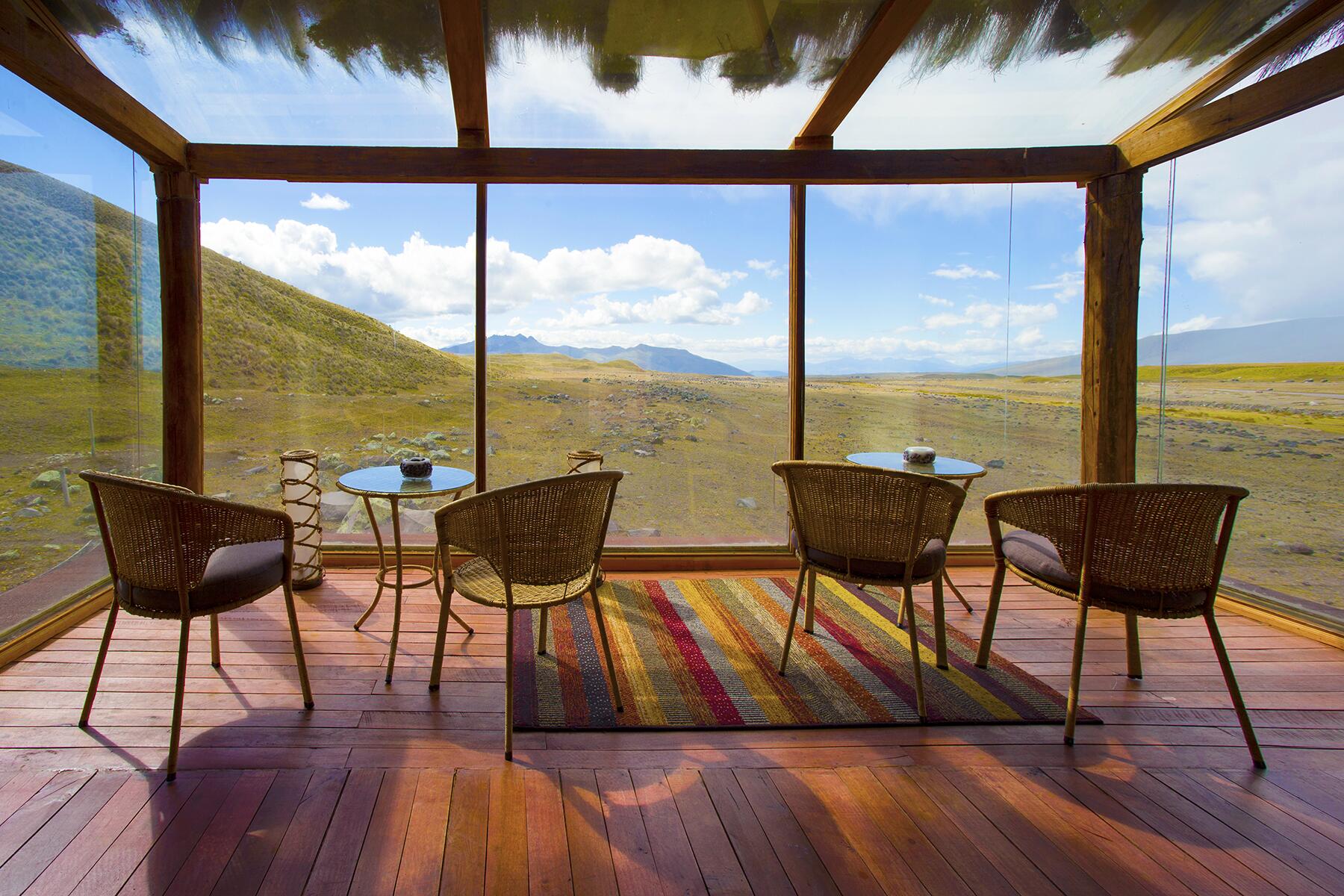Hotels around the world are making huge strides to lessen their environmental impacts, but there’s still a long way to go for this often wasteful industry.
The hotel industry produces nearly 650 million tons of waste each year, according to an assessment done by Reconomy. While many hotels, including the large chains, are making strides in finding eco-friendly ways to run their properties (think not washing sheets daily, providing reef-friendly sunscreen, and replacing plastic straws), these acts can only tip the scales so much. The environmental crisis that we face needs bold moves and innovative solutions, and hotels should take this need as an opportunity to stand out among competitors, rather than another financial burden.
Not all solutions are cheap or easy, but cheap and easy (and disposable) helped us reach the state of emergency that we’re currently in. Though environmentalism often seems expensive, some solutions are not, as a lot of changes simply just take some adjustments, staff training, and guest awareness to be successful. These are some (fairly) simple ways that hotels can start making changes that will have big impacts.
Install Water Refill Stations
Some hotels are ditching the plastic water bottles in your room (yeah, the $8 ones) and adopting filtered, cold water refill stations that guests can use to refill their water jugs, bottles, or whatever their preferred vessel is. Implementing these stations would not only cut down on the extreme amount of trash that hotels create by using water bottles, but they would also cut down on housekeeping responsibilities, allowing staff to focus on other customer service details. The stations would also save travelers money by not having to pay for this basic necessity. A bonus: Hotels have the opportunity to add another piece of branded merchandise to their repertoire by placing their logo on a water bottle that guests will take with them. This can be a lower price-point plastic bottle (BPA-free, of course) to give away or a higher-end Hydro Flask-type container.
Recommended Fodor’s Video
Tone Down the In-Room Ambiance to Save Energy
Walking into a hotel room with music playing overhead or the TV on and tuned to the local travel guide is a very nice way to start a visit to a new hotel, but just how necessary is it? Even if these elements are set on a timer, there are still too many unknown factors that could keep them running for hours, draining electricity. Some guests could also forget to (or not care to) turn them off when they come in or subsequently leave the room, keeping them on for hours.
Make Toiletries Beyond the Basics Available by Request
Sure, the basics like soap, shampoo, conditioner, etc. are necessities to have when traveling, but some hotels still include some items that are just not used on a universal scale. Items like shoe mitts, shower caps, sewing kits, and others are nice to have, but stocking them in every room just isn’t worth the amount of trash that they produce. These items could be available upon request, whether through the hotel’s app, the front desk, or delivery from housekeeping, depending on the most efficient options for each hotel. This way, those who need them can have them, and those who don’t aren’t contributing to more waste.
Or Just Eliminate Single-Use Toiletries Altogether
Now, this may sound like a seriously daunting task, but some of the major hotel chains like Marriott are already phasing out single-use toiletries in favor of larger, refillable bottles. For Marriott, this means eliminating 500 million small bottles that are equivalent to 1.7 million pounds of plastic each year. Even hotels that aren’t part of the giant chains can have a huge impact by making this change. When changing up the size and packaging, it’s also a good time to see if any locally-made products can be integrated into the hotel’s amenities. Purchasing local means less waste in transport costs and more money going into local communities. It’s also a nice perk for guests to be able to try out a local brand that can then be purchased in the hotel gift shop.
Get Rid of the Plastic Key Cards
Key cards are plastic waste, but there are plenty of alternatives that can meet most hotel budgets. The options for environmentally-friendly key cards are more robust than ever, with new cards made from recycled PVC, PVC with enzymes that will break it down quickly, wood fiber, paperboard, and more. There’s also the option to ditch the cards altogether and integrate a cell phone key code option (which has the potential to benefit both hotel and guest through the use of the hotel’s app).
Use Technology to Eliminate Paper
While some hotels have already switched to bedside tablets for guest newspapers and hotel guides, there still aren’t enough. So much paper is wasted daily at most hotels, from the newspaper on room doorsteps to the ever-changing one sheeters of weekly activities. Advances in guest-facing technologies are growing tremendously in the hotel industry, and it’s only a matter of time before screens, apps, and in-room AI replace paper, so why not get on board NOW?
Add More Meatless Options to the Menu
By now we’ve all heard (whether we’ve wanted to or not) that eliminating or even reducing meat from one’s diet has been proven to aid in reducing global warming. Factory farming has a large impact on deforestation, water pollution, and greenhouse gas production. In addition to bringing guests healthier meals, adding more meatless items could have a big impact on the environment, especially for the larger chains. Interstate Hotels & Resorts is currently helping to lead this charge by creating a vegan menu campaign with Beyond Burger, while other hotels are also integrating more plant-based choices and meat substitute options.
Include More Locally Sourced Options
Buying local has such a tremendous impact on an economy (according to American Independent Business Alliance, approximately 48% of a purchase made at a local small business is recirculated locally, compared to less than 14% of a purchase at a chain store), and since hotels benefit from locals as employees, as well as them sharing their space with visitors, it only makes sense that hotels and their guests should put money back into their local economies. Adding items that come from local companies, particularly lotions and other toiletries, foods in the restaurants, in-room snacks, and gifts in the gift shop can make a big difference for a local company. In addition to this economic impact, buying local uses significantly less fuel and employs more local workers.
Eliminate Animals and Animal Encounters
Animal encounters can be a very touchy subject for many travelers, but when it comes down to it, keeping animals in a cage, tank, or on a leash for the entertainment of humans (often under the guise of education) just isn’t ethical. Humans getting too close to animals in their natural habitat isn’t much better, either. Countries like Costa Rica are cracking down on unethical animal tourism through outreach like the #stopanimalselfies campaign and Cambodia has officially banned elephant rides at Angkor Wat. There are plenty of ways to enjoy animals without causing them harm—look for highly reputable eco-tours and be sure to read the reviews. Search out sanctuaries where animals who can no longer exist in the wild can be seen up close and personal with limited risk to them and you (and spend an afternoon volunteering there, while you’re at it).
Use Technology to Cut Down on Heating/Cooling Energy Consumption
Heating and cooling account for a massive chunk of a hotel’s energy use and cost, but in most locations, they’re necessities for guest and staff comfort. Finding ways to make systems more efficient can make a big difference in a hotel’s green footprint. Though this is probably one of the trickiest systems to overhaul, the technology is evolving to make it much easier. One option hotels have is to utilize hardware and software systems to collect data about guest consumption patterns, then use the data to adjust energy outputs, whether at a whole-hotel level or an individual room level.
Dramatically Reduce Food Waste
One of the hotel industry’s biggest offenders is food waste, often the biggest problem that hotels face when tackling their carbon footprint. According to Eco-Business, the amount of food waste in the hotel industry ranges between 25 and 35%, the majority of which is overproduction in the hotel kitchens, with buffets contributing significantly. Eliminating buffets is the easiest route to fixing the problem (along with other steps), but that could prove detrimental to a hotel’s food and beverage program. Instead, phasing them out by adding more cooking stations and creating an education program for guests and employees is a good place to start. Included in this gradual program could also be a switch to an on-site garden and composting program that puts some of the food waste back to work for the hotel and creates an added attraction at the hotel for guests.




